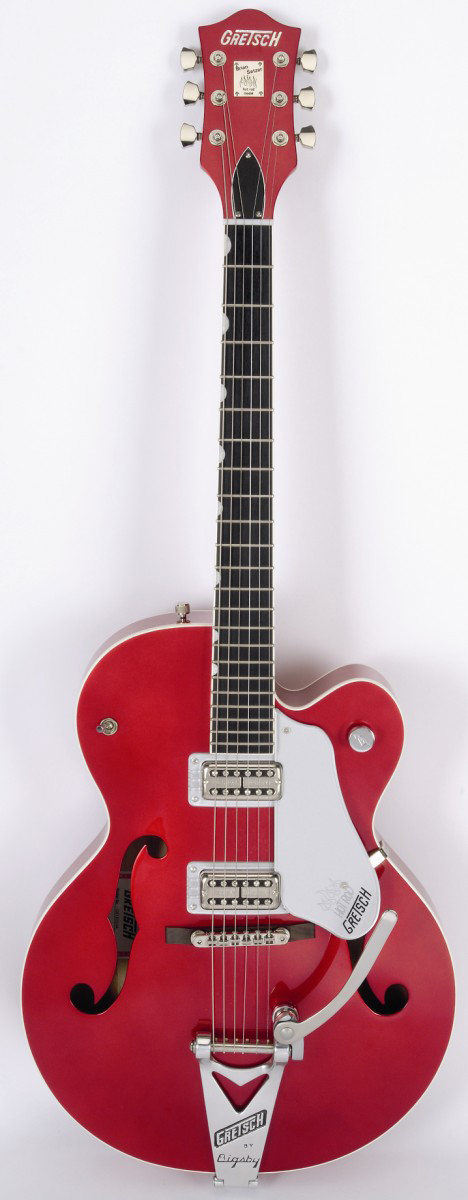MusicRadar Verdict
Well worth checking out!
Pros
- +
Originality of design. Playing comfort. Ricky-like sounds.
Cons
- -
The fact that it will mainly be judged on looks alone.
MusicRadar's got your back
"Well, it's a stunning guitar," I hear you cautiously say, "but it's a shame I don't play rockabilly, though."
C'mon, now. That's like telling Keith Richards he shouldn't be using a Fender Telecaster with The Stones because you reckon they're only suitable for Stetson-wearing country players.
Overview
The Hot Rod is based on Brian's favourite Gretsch model, the aforementioned 6120. Launched in 1954, this iconic guitar was the signature model of Nashville guitar legend and, later, Elvis Presley producer Chet Atkins.
Brian actually has a range of signature guitars in the current Gretsch catalogue. In addition to his 6120SS flame-top models (£2,499 to £2,999), in a choice of orange and green finishes, he has just unveiled the stunning new Black Phoenix (£2,349). We gave you a sneak preview in our Summer NAMM report (TG141).
Like the name suggests, the Hot Rod series is a stripped-down version of the classic 6120. Brian wanted a usable stage guitar with modern performance, without compromising the original guitar's stunning looks and tone.
Just like a hot-rod automobile, it has 1950s looks with wheelspinning power. Yummy. Look closely at the nice pictures on this page and you will notice there's only a single control knob on the Hot Rod.
Brian had the Gretsch dudes remove the individual volume and tone controls, so all you get with this axe is a master volume. Some Gretsch guitars have slightly confusing switching options, so we like the cut of Brian's jib, here. The only other control on the Hot Rod is a standard three-way pickup selector switch.
Some of the smart modifications that Brian perfected with his original 1959 Gretsch 6120 have found their way onto his signature guitars.
Like many vintage guitars, older Gretsch instruments can be subject to tuning problems. The Hot Rod tweaks the snitch of dodgy tuning with a set of Sperzel locking machineheads.
They do the job so well that this guitar didn't lose its tuning the whole time we had it in our clutches. By the way, all that bollocks about Bigsby vibratos causing tuning problems just makes steam come out of our ears.
Brian won't play a guitar without a Bigsby, and he never has any trouble keeping his guitars in tune. And he plays 'em hard, as anyone that has seen him in concert can testify. As long as your Bigsby-equipped guitar is well set up with a correctly cut top nut, it will stay in tune. Got it?
Apart from the killer candy hot-rod finishes and the cool-as-fuck matt black primer option, Brian has come up with two more great features for his signature guitars.
The first is the pinned bridge. On Gretsch guitars, the 'floating' rosewood-based bridge is held in place by the pressure of the strings.
Take the strings off and the bridge will fall off, too. The only real bummer with this arrangement is that the bridge can shift out of position when the Bigsby is wiggled in a frenzied fashion.
For a few years Brian used double-sided sticky tape in an attempt to keep the bridge in place, but with this guitar he went a step further, having it 'pinned' in the correct position. It's such a simple idea and it makes this guitar feel so much more 'solid.'
You can beat that vibrato as hard as you want and give the strings a good whack and the bridge never moves. Nice work, rockabilly legend!
This is super cool! Since the early 1990s, Brian had been trying to persuade the management at Gretsch to build his signature guitars in exactly the same way as his original 1959 guitar.
Gretsch 6120's in the late 1950s and early 1960s had really thin tops that gave the guitar a unique tone, and Brian was dissatisfied with the thicker tops that Gretsch were fitting to his new guitars. When Fender took over Gretsch, Brian finally got his way.
The only problem was that the design plans of those vintage classics had been lost. The brilliant solution to this problem was putting a 1960 6120 through a CAT scan machine, which allowed the designers at Gretsch to see inside the guitar.
What they found was a special kind of internal 'trestle' bracing (a bit like a trestle table, funnily enough). This bracing provides ample support for the thinner top. As a result, all of Brian's recent signature guitars feature trestle bracing and thin tops, including this guitar.
And that means you get the sound and performance of a vintage guitar that would normally cost you £10,000 plus to achieve. So that's why we love the Hot Rod so much!
The Hot Rod guitar comes with a choice of Gretsch-made Filter'Tron pickups (£1,999) or Mr Setzer's personal favourites made by a bloke who goes by the rather cool name of TV Jones, which our guitar has aboard. The extra cost is well worth it, though.
These pickups are high-spec replicas of the original late 1950s Filter'Tron units and they truly are the bee's hairy knees, folks. The Gretsch sound is all about clarity. It's a big bold tone that shimmers like no other guitar, while having enough action in the trouser region to pull some serious beef from an overdriven amp.
No other pickup can give you that Duane Eddy twang, gurgling garage band fuzz and visceral punk power like a Filter'Tron, all in one guitar.
Oh, and if you don't think a Gretsch can do punk, just remember that Tim Armstrong of Rancid has been using a beat-up Country Club model for years. Look, you really have to try this guitar for yourself. You're gonna love it.
Sounds
While the guitar playing folk at TG aren't usually given to false modesty, we decided to take a back seat when it comes to demonstrating the kickass rockabilly tone of the Hot Rod.
If you check out our exclusive (in other words, rare as hen's teeth) Video Guest Lesson with Brian Setzer, on this issue's CD, you will hear the Hot Rod played by the guy who designed it: the greatest rockabilly guitarist of all time, no less.
Not even we can compete with that. Incidentally, the guitar Brian is using in the lesson is a stunning customised version of our Hot Rod axe.
And yes, we touched it… while he wasn't looking, of course. Instead, just because we have been bending your ear about the modern rock credibility of Gretsch guitars, we decided to put our reputation where our mouth is.
Listen to the audio track on the TG CD to hear the Hot Rod giving it some stick in a rock setting. It's a sizzler, baby!
If this review reads more like a history lesson than our usual step-by-step nitpicking session, that's because when you buy a Gretsch guitar you're buying into 50 years plus of rock 'n' roll history.
The Hot Rod is the Cadillac Eldorado to your guitar's Fiat Punto. It sounds better than any guitar you've ever handled and plays like an absolute dream.
It gets two thumbs up from us - Fonz style. Perfectamundo, daddios. In case you hadn't noticed, we've tried to put across the versatility of Gretsch guitars in this review.
For a rockabilly or country guitarist they're a dream come true. The modern features of this Hot Rod model make it possible to play killer rockabilly picking patterns and sizzling lead runs with solid tuning, even if you get a bit wild on that Bigsby.
Those kickass pickups don't hurt, either. But if you don't wear brothel creepers or dream about that glorious post war decade of musical and cultural invention that was the 1950s, then don't walk away just yet.
Thanks to the huge range of instruments that Gretsch offers these days, including the budget Electromatic series, there's a Gretsch guitar for everyone. Just keep an open mind and give one a try. We reckon you'll be pleasantly surprised.
Now, we're going into hiding for a little while. The Gretsch dudes want their guitar back, but they'll have to catch us first...
Total Guitar is Europe's best-selling guitar magazine.
Every month we feature interviews with the biggest names and hottest new acts in guitar land, plus Guest Lessons from the stars.
Finally, our Rocked & Rated section is the place to go for reviews, round-ups and help setting up your guitars and gear.
Subscribe: http://bit.ly/totalguitar
“We are so unencumbered and unbothered by these externally imposed rules or other people’s ideas for what music should be”: Blood Incantation on the making of Absolute Elsewhere and how “Data from Star Trek” saved the album – and the studio
“Delivers streamlined DAW integration with an excellent hammer action keyboard”: Arturia Keylab 88 Mk3 review
“I have an original 909 – every time I try to use it I feel like I’m ruining it”: House hero Riva Starr on his studio essentials and his love of analogue synths











